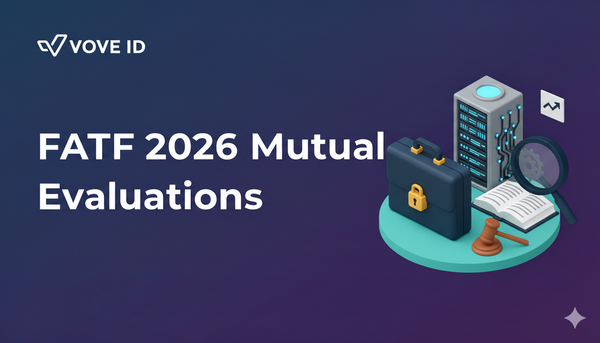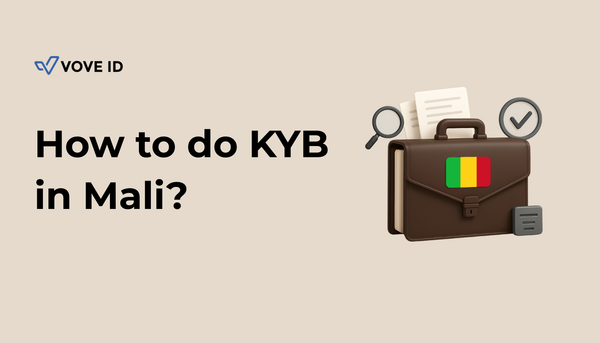AML Compliance in Kenya: 2025 Guide for Fintechs and Regulated Businesses
Navigate Kenya’s 2025 AML regulations with this comprehensive guide. Discover POCAMLA, the 2023 AML/CTF Amendment Act, FATF grey-listing, and how VOVE ID’s solutions empower fintechs, digital wallets, BNPL, and crypto platforms to stay compliant.

Kenya’s financial sector is a global trailblazer, with over 70% of its population using mobile money platforms like M-Pesa, driving fintech innovation and cross-border trade. Yet, this dynamism comes with risks—money laundering and terrorist financing threaten the integrity of this vibrant ecosystem. In 2025, anti-money laundering (AML) and counter-terrorism financing (CTF) compliance is a strategic imperative for fintechs, digital wallets, Buy Now Pay Later (BNPL) providers, and crypto platforms to build trust, secure partnerships, and avoid penalties. Solutions like VOVE ID, with its Kenya-compliant identity verification and monitoring tools, empower businesses to navigate these regulations efficiently, ensuring compliance without compromising growth. Kenya’s ongoing placement on the Financial Action Task Force (FATF) grey list signals heightened global scrutiny, pushing regulators to tighten enforcement.
This guide explores Kenya’s AML framework, compliance obligations, fintech challenges, and how VOVE ID’s tailored solutions streamline adherence while fueling innovation.
Regulatory Framework for AML in Kenya
Core Legislation: POCAMLA and Its Evolution
The Proceeds of Crime and Anti-Money Laundering Act (POCAMLA), 2009, is Kenya’s cornerstone AML law. It criminalizes money laundering, sets penalties, and mandates reporting for “reporting institutions,” including banks, fintechs, insurers, forex bureaus, securities dealers, and, following recent expansions, real estate agents and high-value goods dealers.
The Anti-Money Laundering and Combating of Terrorism Financing Laws (Amendment) Act, 2023, strengthened the framework with:
- Beneficial Ownership Transparency: Companies must maintain accurate ultimate beneficial owner (UBO) records to prevent illicit flows through shell entities.
- Broader Scope: New sectors like real estate, accounting, and precious metals dealers now face AML/CTF obligations.
- Enhanced Coordination: Regulators and law enforcement collaborate more effectively to combat financial crime.
- Stricter Penalties: Non-compliance can result in fines up to KES 20 million (~USD 154,000) or seven-year imprisonment for individuals, with higher corporate penalties.
Key Regulators and Their Roles
Kenya’s AML ecosystem involves multiple agencies:
- Financial Reporting Centre (FRC): Kenya’s financial intelligence unit collects and analyzes Suspicious Transaction Reports (STRs) and shares insights with law enforcement.
- Central Bank of Kenya (CBK): Oversees AML compliance for banks, payment providers, and digital wallets, enforcing POCAMLA and CBK guidelines.
- Capital Markets Authority (CMA): Regulates investment firms and securities dealers, ensuring market integrity.
- Insurance Regulatory Authority (IRA): Monitors insurers and intermediaries for AML/CTF compliance.
- Enforcement Bodies: The Asset Recovery Agency (ARA), Directorate of Criminal Investigations (DCI), and Office of the Director of Public Prosecutions (ODPP) investigate and prosecute violations.
Kenya’s FATF Grey-Listing Status
As of February 2025, Kenya remains on the FATF grey list due to gaps in beneficial ownership transparency and enforcement in high-risk sectors. While not a blacklist, grey-listing triggers:
- Increased Due Diligence: Foreign partners and correspondent banks apply stricter checks, potentially delaying transactions.
- Reputational Challenges: Non-compliant businesses risk losing international trust.
- Heightened Inspections: The CBK and FRC are intensifying audits to align with FATF standards, aiming for Kenya’s exit by 2026.
Private sector compliance is pivotal to this goal, making robust AML frameworks essential for businesses.
AML Compliance Obligations
Regulated businesses must adhere to the following requirements:
- Customer Due Diligence (CDD)
- Verify identities using official documents (e.g., national ID, KRA PIN, passport).
- Confirm UBOs for legal entities, aligning with the 2023 Amendment Act.
- Apply Enhanced Due Diligence (EDD) for high-risk customers, such as politically exposed persons (PEPs) or those from high-risk jurisdictions.
- Ongoing Transaction Monitoring
- Track transactions for anomalies, such as large cash deposits or rapid transfers inconsistent with customer profiles.
- Use risk-based approaches to flag suspicious activity.
- Suspicious Transaction Reporting (STRs)
- Report suspicious transactions to the FRC within seven days.
- Non-compliance risks fines or license revocation.
- Record Keeping
- Retain CDD, transaction, and STR records for at least seven years, accessible for audits.
- Staff Training and Compliance Programs
- Train employees on AML/CTF red flags and reporting procedures.
- Appoint a Money Laundering Reporting Officer (MLRO) to oversee compliance.
Challenges for Fintechs and Startups
Kenya’s fintech boom, with platforms like M-Pesa and emerging crypto exchanges, faces unique AML hurdles:
- Regulatory Complexity: Startups often lack dedicated compliance teams to navigate POCAMLA’s evolving requirements.
- Manual Processes: Slow, error-prone verification hampers scalability and user experience.
- Cross-Border Operations: Serving East Africa’s diverse markets means grappling with varied ID systems and AML standards.
- Grey-Listing Impact: Increased scrutiny raises compliance costs and delays cross-border settlements.
How VOVE ID Empowers Compliance
VOVE ID offers tailored, Kenya-compliant solutions to streamline AML adherence for fintechs, digital wallets, BNPL providers, and crypto platforms:
- Automated Identity Verification: Verify individuals and businesses using Kenya’s national ID systems, KRA PINs, and global databases, ensuring POCAMLA compliance.
- eKYC and Biometric Authentication: Accelerate onboarding with secure, user-friendly biometrics, reducing fraud while meeting CBK standards.
- AI-Driven Transaction Monitoring: Detect suspicious patterns in real time, enabling timely STR filings.
- Beneficial Ownership Verification: Automate Know Your Business (KYB) processes for UBO checks, aligning with the 2023 Amendment Act.
- Scalable APIs: Integrate compliance into existing systems, minimizing costs for startups and high-growth firms.
Industry benchmarks suggest VOVE ID’s tools can reduce compliance costs by up to 40% and cut onboarding times by 50%, enhancing efficiency without compromising regulatory trust.
Why AML Compliance Matters in 2025
A 2023 Sentry report estimates Kenya lost USD 10.6 billion to illicit financial flows since 1970, underscoring the stakes of AML enforcement. Compliance in 2025 is critical to:
- Protect Customers: Shield users from fraud and financial crime.
- Build Trust: Strengthen credibility with regulators, investors, and global partners.
- Avoid Penalties: Mitigate risks of fines, license suspensions, or reputational damage.
- Support FATF Exit: Robust compliance accelerates Kenya’s grey-list exit, boosting its global financial standing.
Practical Steps for Compliance
- Adopt Technology: Use VOVE ID’s solutions for automated CDD, KYB, and monitoring.
- Train Staff: Equip teams with AML/CTF knowledge and reporting skills.
- Engage Regulators: Stay updated via CBK and FRC consultations.
- Assess Risks: Regularly evaluate AML exposure, especially for cross-border operations.
- Choose Reliable Partners: Collaborate with compliance-focused vendors to optimize processes.
❓FAQ: AML in Kenya
Why is Kenya on the FATF grey list?
Kenya is under increased monitoring due to gaps in beneficial ownership transparency and enforcement in high-risk sectors, with FATF pushing for reforms by 2026.
Who must comply with POCAMLA?
All reporting institutions—banks, fintechs, insurers, forex bureaus, securities dealers, and newly included sectors like real estate and precious metals dealers.
Can startups afford AML compliance?
Yes, automated solutions like VOVE ID enable cost-effective compliance without large in-house teams.
Conclusion
In 2025, AML compliance is a gateway to sustainable growth in Kenya’s dynamic financial sector. With POCAMLA, the 2023 AML/CTF amendments, and FATF grey-listing shaping the landscape, fintechs and regulated businesses must prioritize robust, tech-driven frameworks. VOVE ID’s solutions empower firms to meet regulatory demands efficiently, protect against financial crime, and build trust in Kenya and beyond. By staying compliant, businesses not only safeguard their operations but also contribute to Kenya’s journey toward a stronger, safer financial ecosystem.
Ready to simplify AML compliance and boost efficiency? Book a free demo with VOVE ID today to discover how our tailored solutions can streamline your KYC, KYB, and transaction monitoring processes.




